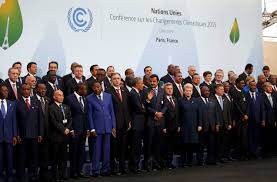World leaders assembled in Sharm El-Sheikh, Egypt on the 7th and 8th of November to deliberate on how to further deliver on the world climate agenda and translate climate commitments into implementation. The gathering was themed: “Together for Implementation.”
The various Heads of State and Government who gathered together acknowledged the scientific findings on present and future effects of climate change and realized the weight of the climate emergency facing the earth. The focus was on the fact that the world has experienced unparalleled extreme weather conditions with notable costs that have adversely affected the lives and livelihoods of the most vulnerable communities.
The leaders precisely stated that the climate crisis is a principal threat to our planet with lacing significance on the stability, safety, and sustainability of communities globally.
They also reiterated that it was time to move from pledges to rapid, robust, and impactful implementations.
In light of the above, leaders welcomed the convening of six multi-stakeholder high-level roundtable discussions over the two days of the Summit that highlighted possible solutions to chart a path to overcome climate challenges and how to provide the finance, resources, and tools to effectively deliver climate action at scale.
Based on the discussions among the convening world leaders, the COP27 Presidency has captured the following messages:
Just Transition Roundtable:
There is an imperative need to further develop strategies and mobilize appropriate and adequate finance, technology transfer, capacity building, and major climate investments from developed to developing countries to ensure a just transition for the most vulnerable communities. It was underlined that innovative financial mechanisms such as debt swaps, concessional loans, and debt reduction frameworks should be developed and leveraged;
Energy transition should be just and inclusive, aiming at reliable and affordable clean energy resources to ensure energy security, eradicate energy poverty and achieve economic growth. Inclusion must spotlight that transitions will be different and various complexities must be navigated;
A just transition should take into consideration all socio-economic aspects based on the principles of CBDR and different national circumstances.
Innovative Finance Roundtable:
Consistent with the convention and its Paris agreement, public finance remains to be the main source of funding for mitigation and adaptation projects, as well as capacity building in developing countries, to deal with the impacts of climate change;
Additional finance from the private sector should be deployed in developing countries to contribute to their efforts in combating the adverse impacts of climate change. To enable such finance, there is a need to understand key obstacles and eliminate barriers through relevant policy frameworks;
Climate finance providers, in particular multilateral and bilateral development banks, are well positioned to increase climate ambition using the breadth of their policy and financial instruments for greater results to align with the goals of the Paris Agreement;
Scaling up the MDBs’ climate action involves both a significant expansion in the scope of their activities and a major increase in the volume of their financing.
To realize their full potential in climate action, multi-lateral development banks should undergo the necessary reforms to increase their finance climate projects in developing countries;
Project readiness and concessional financing including equitable distribution to both developing and developed countries are integral and have to recognize the various vulnerabilities and needs. The disparity in interest rates between developing and developed countries and the need to reduce the cost of capital were indicated. Additionally, there was a collective call to remove existing barriers and bottlenecks to facilitate timely, sufficient, and equitable access to finance.
Investing in the Future of Energy: Green Hydrogen Roundtable:
Leaders raised the importance to enhance global cooperation in unlocking the potential of green hydrogen production and application as part of the future of clean energy transformation, and the decarbonization of the hard-to-abate industries and sectors;
It is essential to support the integration of green hydrogen roadmaps within NDCs, including policies such as public procurement and fiscal incentives that drive the production and use of green hydrogen;
MDBs, DFIs, and commercial banks are encouraged to include low-carbon hydrogen in their green financing and investing taxonomies (e.g., for green bonds), and to develop incentives for green hydrogen projects, such as differentiated loan interest rates;
The Global Renewable Hydrogen Forum co-led by Egypt and Belgium was announced, which constitutes a multi-stakeholder public-private platform designed to facilitate large-scale development and deployment of renewable hydrogen to foster decarbonization of local industries, accelerate just transition and unlock the environmental and socio-economic benefits of the global hydrogen economy, and to identify the best instruments enabling the cross-border trade and corridors between renewables-rich developing countries and developed countries to further advance the international green hydrogen value chain.
Food Security Roundtable:
The risks of hunger and malnutrition among the most vulnerable groups exacerbated by climate change were stressed. It was agreed that the agriculture sector has a unique position, being on one hand among the most vulnerable to climate change, and on the other a major contributor to GHGs emissions and the main driver of deforestation;
The transformation of the food systems is a cornerstone in combating climate change including regenerative agricultural practices, reduced trade restrictions, and changes in consumption and diet patterns, as well as looking into alternatives for proteins;
The implementation of climate-resilient agriculture and food systems requires political will, international cooperation, generation and exchange of knowledge and best practices, as well as financial resources to support producers and value chain actors across the world to operate the necessary transformations;
An increase in the investment in adaptative and resilient agricultural practices and food systems innovation ecosystems is needed, including innovative financial services, data, and digital infrastructure, wider research, development, and demonstration (RD&D), measures to reduce import dependency and increase on-farm yields of local varieties, improved smallholder farm management skills and cold chain-based commodity associations and measures that consider maladaptation risks.
Water Security Roundtable:
The importance of satisfying the basic human need for sustainable access to adequate quantities and acceptable quality of water for sustaining livelihoods, human well-being, and climate-resilient socio-economic development;
Driving information from data using advanced software techniques is an important pillar in any multi-fora cooperation. Enhanced efforts in existing approaches to transboundary water cooperation, scaling up implementation of water conventions and processes;
Protecting and managing water resources will require a multi-stakeholder cross-sectoral approach at all levels, to implement the policies and actions that maximize the benefits and avoid causing adverse socio-economic impacts;
Policies on transboundary water management should be reflected in climate policies while adhering to the principles of inclusive cooperation, constructive engagement, and mutual support among states sharing water resources in implementing water-related adaptation projects;
The importance of raising public awareness on the mutual interdependence between climate change and water security; and adopting climate-resilient policies for sustainable water management and water-related climate adaptation;
Water agenda and relevant policies should be elevated across the environmental and economic agenda to ensure the decoupling of freshwater use from economic growth while ensuring water security.
Climate Change and the Sustainability of Vulnerable Communities Roundtable:
Support for the vulnerable communities, who are on the frontline of climate change, should no longer be a subject of charity but must be handled in the context of sustainable development, equitably;
Adapting to evolving climate conditions and recovering from climate impacts driving many countries into greater debt is needed, which is sometimes compounded by the cost of debt due to the economic impacts of lost productive capacity;
Scaling up climate finance and improving access to climate finance in addition to deploying financing schemes such as debt for climate swaps to help reduce countries’ debt in exchange for climate action and commitments;
The relationship between humanitarian agencies and the affected communities has to be flipped. Local communities need to guide actions with their local knowledge.
Adapting to climate change now and developing clean and green technologies is indispensable. It is imperative to convert the Paris commitments into tangible action and ensure that all pledges and promises are delivered and adequate public finance is provided. There is a role for multilateral development banks, and the international financial system as a whole, to step in and support initiatives that will deliver both prosperity and a cleaner, greener future on the different climate-relevant issues.
Overall discussions reflected general agreement among the heads of state and government on the need to move urgently towards implementation and action on the ground.


















